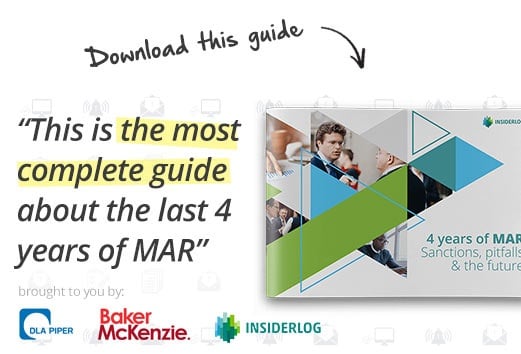Created to halt market abuse in its tracks, the Market Abuse Regulation (MAR) outlines seven major market abuse offences deemed as market abuse, laying down strict criminal and civil penalties.
Any party seen to be manipulating and misleading the market with false information and dishonest transactional behaviour will be subject to harsh financial and market abuse regulation sanctions.
This article will run you through the current market abuse penalties under MAR, with five key market abuse cases to highlight the importance of complying with the regulation’s provisions.
1. What Constitutes A Market Abuse Offence?
Seven market abuse behaviours are considered to be an offence under the Market Abuse Regulation (MAR):
- Insider trading — According to MAR, insider dealing is the act of illegally using inside information to make trades to advantage one’s investments.
- Unlawful disclosure of inside information — Unlawful disclosure refers to the act of revealing inside information to a third party without following the proper processes and procedures for dissemination of such information. To prevent unlawful disclosure, MAR mandates the use of insider lists which help track who has (had) access to inside information at a specific moment in time.
- Improper use of inside information — Improper use or misuse of information covers all occurrences where inside information is used to advantage the perpetrator or where the usual standard of behaviour is not followed.
- Transaction manipulation — Transaction manipulation occurs when a person undertakes certain transactional behaviours that affect the price and market value of assets in a misleading way, such as fixing prices or selling low.
- Device manipulation — An extensive transactional manipulation, device manipulation occurs when a person or entity attempts to skew market prices with the help of fictitious devices and deceptive rhetoric.
- Misleading dissemination — This market abuse behaviour occurs when a person distributes false and misleading information with insider knowledge of its falsehood.
- Market distortion — This final clause rounds off the seven market abuse behaviours by covering all other behaviours that don’t follow the standardised course of proceedings, and that which distorts or misleads the market in any way.
2. What Are the Penalties Under MAR?
According to the MAR regime, the following sanctions can occur when an organisation is found to be in breach of any of the regulation’s provisions:
(a) an order requiring the person responsible for the infringement to cease the conduct and to desist from a repetition of that conduct;
(b) the disgorgement of the profits gained or losses avoided due to the infringement insofar as they can be determined;
(c) a public warning which indicates the person responsible for the infringement and the nature of the infringement;
(d) withdrawal or suspension of the authorisation of an investment firm;
(e) a temporary ban of a person discharging managerial responsibilities within an investment firm or any other natural person, who is held responsible for the infringement, from exercising management functions in investment firms;
(f) in the event of repeated infringements of Article 14 or 15, a permanent ban of any person discharging managerial responsibilities within an investment firm or any other natural person who is held responsible for the infringement, from exercising management functions in investment firms;
(g) a temporary ban of a person discharging managerial responsibilities within an investment firm or another natural person who is held responsible for the infringement, from dealing on own account;
(h) maximum administrative pecuniary sanctions of at least three times the amount of the profits gained or losses avoided because of the infringement, where those can be determined (MAR Article 30(2))
| MAR Article Infringement | Maximum Administrative Pecuniary Sanctions | |
| For a natural person | 14 and 15 | Up to €5,000,000 in fines |
| 16 and 17 | Up to €1,000,000 in fines | |
| 18, 19, and 20 | Up to €500,000 in fines | |
| For legal persons | 14 and 15 | Up to €15,000,000 or 15% of the annual turnover from the last available accounts |
| 16 and 17 | Up to €2,500,000 or 2% of the annual turnover from the last available accounts | |
| 18, 19, and 20 | Up to €1,000,000 in fines |
3. Market Abuse Penalties: Sanctions Case Studies
3.1 MAR Sanctions Case Study #1 – Chrome Mining And Minerals Producer Fined €1.45 million
In breach of Article 17 of MAR, a large chrome mining and minerals producer was charged by the Finnish Supervisory Authority (FIN-FSA) with failing to disclose inside information about a planned takeover bid in a timely manner. In addition, the company failed to comply with Article 18 as it did not draw up an insider list with regards to this inside information.
It was deemed that, by delaying the announcement of the inside information, this issuer prevented market participants from making informed decisions.
3.2 MAR Sanctions Case Study #2 – Former MD of Shipping Company Fined €50,000
In late 2019, the former Managing Director of an international shipping firm was fined €50,000 for failing to notify financial authorities of personal trades.
In his position as a Person Discharging Managerial Responsibilities (PDMR), the ex-MD had a responsibility to notify the FCA about trades undertaken on his account within three business days. The result was market abuse regulation sanctions of €50,000.
Having failed to report transactions in a timely manner on three separate occasions between 2016 and 2017, the former MD breached inside information disclosure regulations.
3.3 MAR Sanctions Case Study #3 – Danish Bank Faces Criminal Complaints
The Danish Financial Supervisory Authority (FSA) found a prolific Danish bank guilty of market manipulation between August 2016 and February 2019 with a series of ‘wash trades’.
Wash trades are a process whereby an individual or entity sells shares to themselves.
Trading with oneself is a criminal sanction under MAR if the behaviour is considered to manipulate the market. In this case, the Danish bank’s decision-makers face market manipulation criminal offence complaints, a prison sentence, and hefty fines.
3.4 MAR Sanctions Case Study #4 – Former Chief Executive of Spread Trading Company is Fined €727,600
The UK’s FCA has fined the previous Chief Executive of a huge spread trading company for failing to declare significant loans to the firm’s group and its subsidiaries when floating the company.
Considerably influencing the price of shares, the FCA deemed with omission to be an ‘internal hedging strategy’ aimed to manipulate the market. These omissions are predicted to have accounted to up to €13.9 billion.
3.5 MAR Sanctions Case Study #5 – French Watchdog Fines US Bank €20 million
French financial watchdog, AMF, fined top US bank for manipulating bonds. The fines amounted to around €20 million.
The bank is accused of manipulating the price of several bonds and futures contracts, including 14 different French government bonds, known as OATs; eight Belgian bonds, known as OLOs; and an OAT futures contract.
|
For more case studies and examples, see our ebook “4 Years of MAR: Sanctions, Pitfalls & The Future”. |
4. Market Abuse Penalties: FAQs
4.1 Is market abuse a civil offence?
MAR clearly outlines the activities considered to be market abuse, categorising all seven of these market abuse behaviours as civil offences.
This gives financial authorities the power to detect, prevent, and penalise any party caught undertaking these market abuse behaviours.
4.2 What are the penalties of insider dealing?
Purposeful and accidental insider dealing (trading) carries the risk of serious penalties.
While MAR lays down strict sanctions for insider trading, some countries have chosen to apply ever more stringent penalties.
As noted in MAR, any natural person found guilty of insider trading is subject to fines of up to €5,000,000. Any legal person found in breach of Article 14 banning insider dealing faces fines of up to €15,000,000 or 15% of the annual turnover from the last available accounts.
Other examples of administrative sanctions include:
- Disgorgement of profits gained or losses avoided from insider trading
- A public warning
- Temporary or permanent suspension
- Extra fines of up to three times the profits gained or loss avoided from insider trading
4.3 Can the general public be prosecuted for market abuse?
MAR applies to any person or entity participating in market trading, in regards to the following financial instruments:
- Any instruments traded on the regular market (or where a request for admission has been made)
- Any instruments traded, admitted or requested for admission on a multilateral trading facility (MTF)
- Any instruments traded, admitted or requested for admission on an organised trading facility (OTF)
- Any instruments not covered here but where the price depends on or fluctuates with market activity
5. Conclusion
To maintain market integrity and transparency, the financial authorities bound by MAR have an arsenal of market abuse penalties at their disposal.
To stay compliant, ensure that all inside information processes and procedures are kept up-to-date according to the stipulations outlined in MAR.
It’s also worth noting that all suspicious market behaviour should be reported to relevant financial authorities immediately. Otherwise, you run the risk of breaching MAR, too.
Share this post
Article Summary
- 1. What Constitutes A Market Abuse Offence?
- 2. What Are the Market Abuse Regulation Penalties Under Mar?
- 3. Market Abuse Penalties: Sanctions Case Studies
- 3.1 MAR Sanctions Case Study #1 – Chrome Mining And Minerals Producer Fined €1.45 million
- 3.2 MAR Sanctions Case Study #2 – Former MD of Shipping Company Fined €50,000
- 3.3 MAR Sanctions Case Study #3 – Danish Bank Faces Criminal Complaints
- 3.4 MAR Sanctions Case Study #4 – Former Chief Executive of Spread Trading Company is Fined €727,600
- 3.5 MAR Sanctions Case Study #5 – French Watchdog Fines US Bank €20 million
- 4. Market Abuse Penalties: FAQs
- 4.1 Is market abuse a civil offence?
- 4.2 What are the penalties of insider dealing?
- 4.3 Can the general public be prosecuted for market abuse?
- 5. Conclusion






